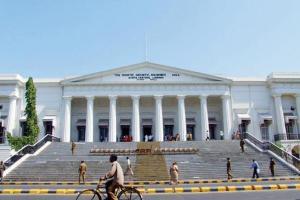How can we ensure that the guardians of our local history are able to survive and thrive?

The Asiatic Library in Mumbai
 A legacy that was built over 40 years was extinguished in a little less than five minutes. Such was the clinical precision with which the death knell was recently sounded on the decision for Bombay Local History Society (BLHS) to move out of its premises at St Xavier's College. The society had to discontinue its operations from the very same college that had nurtured the city's first ever platform for urban history. We could hear a collective gasp when the office bearers read out the inevitable decision at the SOS session. Known for its outstanding contribution to urban history research, BLHS would now no longer function from the same address on Mahapalika Marg.
A legacy that was built over 40 years was extinguished in a little less than five minutes. Such was the clinical precision with which the death knell was recently sounded on the decision for Bombay Local History Society (BLHS) to move out of its premises at St Xavier's College. The society had to discontinue its operations from the very same college that had nurtured the city's first ever platform for urban history. We could hear a collective gasp when the office bearers read out the inevitable decision at the SOS session. Known for its outstanding contribution to urban history research, BLHS would now no longer function from the same address on Mahapalika Marg.
ADVERTISEMENT
Thankfully, when the time came to decide on the fate of the society, most members voted in favour of keeping the society alive rather than shutting shop for good. As a temporary arrangement, the society will run from the home of one of its members. The logistics of it were worked out by concerned members, many of whom got highly emotional while trying to seek answers from the office bearers about the rushed manner in which the decision had been arrived at. Sadly, there were no concrete answers apart from the fact that the society wasn't registered. Despite the efforts by these die-hard Bombayphiles in the room, we felt a sense of deep loss for the city, as the proceedings reached its inevitable conclusion. The whys and hows continued to be debated and discussed by members long after the meeting had ended.
In whatever avatar the BLHS resumes its operations, we dearly hope that fresh, new blood is infused into its veins. For, one of the core reasons for the slow fade-out of it in its current muted form was the lack of building a young membership base. That day, when possibly the last session inside St Xavier's College was in progress, we watched in disappointment as not a single young person (and by this we mean, 30 years and younger) was part of the proceedings. It couldn't have been a more obvious reason about what ailed the society. In a college known for its rich tradition of student participation, this came as a surprise.
This brings us to the bigger question. Did such an initiative meet its fate simply because it wasn't registered, didn't have a commercial model, lacked younger members and a vibrant digital presence? We had seen the writing on the wall at previous sessions and trails, where participation from younger people was far from encouraging. And this over the years, we suspect, would have slumped to negligible numbers to think of any sort of revival by the time its recent fate had been sealed.
It's a lesson for all of us invested in the health of this city's historicity. Can it continue to nurture and support such initiatives? The critical point to raise here is who will power it. The need of the hour is for more young minds — students from schools and colleges — to come forward and invest time and effort. And, for this to happen, educational institutions ought to include urban history as part of their syllabus and not look at visits to museums and heritage sites, and walking trails, as extra-curricular activities. Let the BLHS example act as a reminder of what could and couldn't be.
The interest for local history needs to be sensitively ingrained in our system for Gen Next to look at it with new eyes and perspective. Only then, we feel, will such initiatives receive the much-needed thrust from curious young minds who will, hopefully, be able to keep alive the legacy of their beloved Bombay.
mid-day's Features Editor Fiona Fernandez relishes the city's sights, sounds, smells and stones...wherever the ink and the inclination takes her. She tweets @bombayana
Send your feedback to mailbag@mid-day.com
Catch up on all the latest Crime, National, International and Hatke news here. Also download the new mid-day Android and iOS apps to get latest updates
 Subscribe today by clicking the link and stay updated with the latest news!" Click here!
Subscribe today by clicking the link and stay updated with the latest news!" Click here!






